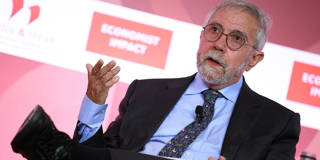Following the US Federal Reserve's decision to cut its policy rate by 50 basis points, mainstream economists are heaping praise on the central bank for supposedly reining in inflation while also maintaining growth and high employment levels. Yet the data clearly show that monetary policy has been mostly a non-factor.
AUSTIN – Google “shamanism” and you will find that it is “a tradition of part-time religious specialists who establish and maintain personalistic relations with specific spirit beings through the use of controlled and culturally scripted altered states of consciousness.” Every element of that definition applies to monetary policymaking today, as illustrated by the reaction to the US Federal Reserve’s September 18 decision to cut the short-term interest rate by 50 basis points.

AUSTIN – Google “shamanism” and you will find that it is “a tradition of part-time religious specialists who establish and maintain personalistic relations with specific spirit beings through the use of controlled and culturally scripted altered states of consciousness.” Every element of that definition applies to monetary policymaking today, as illustrated by the reaction to the US Federal Reserve’s September 18 decision to cut the short-term interest rate by 50 basis points.